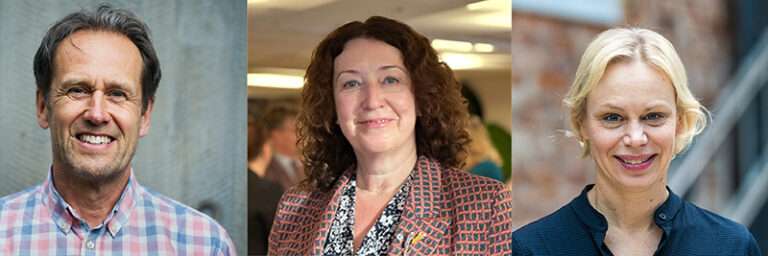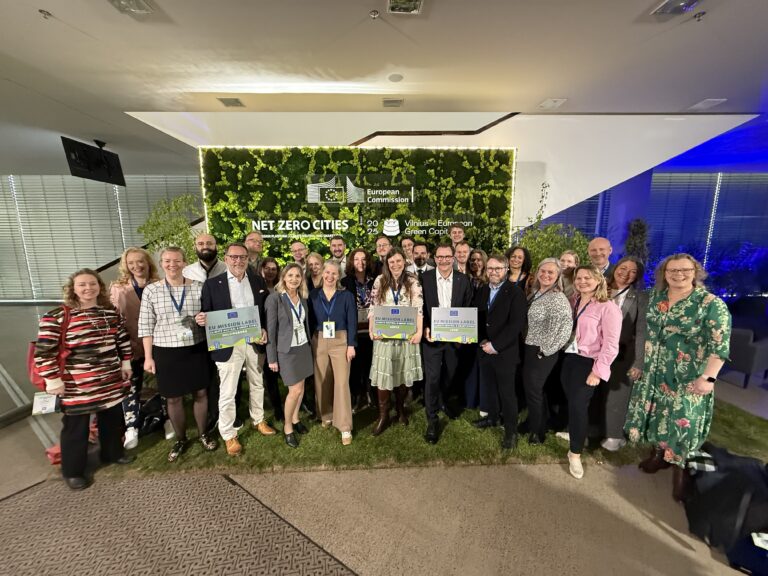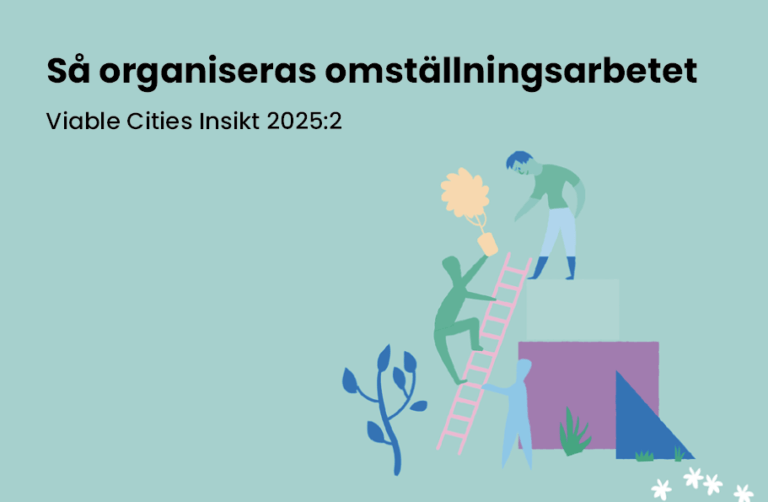Sweden takes the lead in climate transition of cities
Today, December 11, 2020, is a big day for the urban climate transition. The first climate contracts in Europe have now been signed by the political leadership of nine Swedish cities and the Directors-General of four government agencies and Viable Cities.
- Swedish cities are now taking the lead in Europe and, with Climate City Contract 2030, showing the way for the transition that all cities must make. Climate City Contract "2030 is the beginning of a long-term cooperation between nine municipalities, Swedish government agencies and - soon also - the EU," says Allan Larsson, Chairman of the Board of Viable Cities.
Watch the event in retrospect below or here
Cities have a crucial role in the climate transition and in engaging citizens, businesses, academia and civil society. Cities represent only 3% of the Earth's land mass, but account for more than 70% of greenhouse gas emissions. In addition, cities are growing rapidly. By 2050, 85% of the EU population will live in cities.
Through Climate City Contract 2030, which was signed during European Viable Cities Day, cities are committed to accelerating the transition to climate neutrality and increased sustainability. Viable Cities and the authorities - the Swedish Energy Agency, Vinnova, Formas and the Swedish Agency for Economic and Regional Growth - are committed to supporting and facilitating the cities' work.
- Energy is a cornerstone of any sustainable society. The Swedish Energy Agency's work on innovative energy and climate solutions for the urban transition is crucial in the effort to achieve a modern fossil-free welfare society. I look forward to a developed collaboration with other government agencies and ambitious municipalities, says Robert Andrén, Director General of the Swedish Energy Agency.
The contract commits Viable Cities to continue to drive the climate transition forward together with the authorities, the nine cities and other partners such as business, academia and civil society. Achieving the goal of climate-neutral cities requires the involvement of all parts of society.
- There are several areas where Uppsala as a society needs to reduce our climate emissions, but which we do not have control over in the municipality. Uppsala needs collaborations like these to achieve our climate goals. We have an ambitious climate policy, but we can't do everything ourselves," says Erik Pelling (S), Chairman of the Municipal Executive Board Chairman.
Climate City Contract 2030 is in line with the EU's upcoming calls for climate-neutral cities and provides good opportunities for developed European cooperation. The ambition is for Sweden, as a pioneer, to inspire a European Climate City Contract that can contribute to a faster transition.
- The nine cities that have signed the Climate City Contract today are a source of inspiration for all European cities that want to become climate neutral. During 2021-2027, the EU's research and innovation program "Horizon Europe" will help EU cities in their climate transition and we hope for many more European Climate City Contract, says Christian Danielsson, Head of the European Commission in Sweden.
The nine cities - Enköping, Järfälla, Gothenburg, Lund, Malmö, Stockholm, Umeå, Uppsala and Växjö - are testing new solutions and learning from them so that other cities can adapt more easily and quickly.
- " Climate City Contract 2030 means joining forces to 'fix the climate' while moving towards sustainable cities with a good life for all within the boundaries of the planet," says Olga Kordas, Viable Cities Program Manager.
- In concrete terms, this means that everyone in the city should have an everyday life where both we and the planet feel good. For example, the climate transition should contribute to more greenery, better air, better mental and physical health and safer cities where children and adults can live, play and thrive.
Over the next year, Viable Cities expects the Climate Neutral Cities 2030 initiative to grow with another 10 Swedish cities.
Below you will find quotes from several parties and a FAQ on Climate City Contract 2030.
The contract in its entirety is available at viablecities.se/Climate City Contract-2030
Quotes from signing parties
Enköping municipality
- Enköping represents all of Sweden's smaller municipalities and we will lead the way and show that the transition is a priority when we build and develop a growing municipality. We will involve our young people, produce a climate investment plan and develop digital tools to take bigger steps in the green transition in the coming years," says Ingvar Smedlund, Member of the Municipal Executive Board Chairman, Enköping Municipality.
City of Gothenburg
- The intentions of Climate City Contract 2030 are fully in line with the City of Gothenburg's new environment and climate program, focusing on implementation, financing strategies, governance and management. "In 2021, we plan to establish a climate transition function to focus in particular on developing climate investment plans and to further engage citizens in the climate transition," says Axel Josefson, Member of the City Council Chairman, City of Gothenburg.
Lund municipality
- The climate contract shows that Lund Municipality wants to continue to lead the way on the climate issue through innovation and increased cooperation with more actors in our society. This challenge requires new ways of working, and Lund wants to be a test bed for the climate solutions of the future," says Philip Sandberg (L), member of the Lund City Council Chairman.
City of Malmö
- Around the world, cities are taking the lead in the green transition. Through the Climate Contract, we join forces with the state to accelerate several decades of successful local environmental and climate work, while focusing on creating an inclusive and equal Malmö. By harnessing the local power and the cities' willingness and ability to drive change, we can achieve the goals of the Paris Agreement and the EU Green Deal in the long term," says Katrin Stjernfeldt Jammeh (S), Member of the Malmö City Council Chairman .
City of Stockholm
- To achieve our goal of a fossil-free and climate-positive Stockholm in 2040, new collaborations and innovations are needed. Stockholm will be a test bed for climate-smart solutions that can be scaled up and become part of the everyday lives of Stockholmers. Through the climate contract, we undertake, among other things, to develop digital support for the climate transition. The contract will be an important part of the implementation of Stockholm's new climate action plan", says Anna König Jerlmyr, Finance Mayor of the City of Stockholm.
Uppsala municipality
- There are several areas where Uppsala as a society needs to reduce our climate emissions, but which we do not have control over in the municipality. Uppsala needs collaborations such as these to achieve our climate goals. We have an ambitious climate policy, but we can't do everything ourselves," says Erik Pelling (S) of the municipal executive board Chairman.
Växjö municipality
- Växjö municipality has been, is and will continue to be, an important pioneer and actor in the global climate work. By now being one of the first nine cities in Sweden to sign a Climate City Contract , we are taking that leadership, both nationally and within the EU, and pointing out important strategic areas for a faster transition to an attractive, climate-neutral Växjö in 2030, says Anna Tenje (M), member of the municipal executive board Chairman, Växjö municipality.
- "I see this Climate City Contract as a starting point and basis for the dialog and collaboration with business, civil society, academia and the inhabitants of Växjö that is now necessary for us to be successful in our work," says Anna Tenje (M), member of the municipal board Chairman, Växjö municipality.
Energy Authority
- Energy is a cornerstone of any sustainable society. The Swedish Energy Agency's work on innovative energy and climate solutions for the urban transition is crucial in the effort to achieve a modern fossil-free welfare society. I look forward to a developed collaboration with other government agencies and ambitious municipalities, says Robert Andrén, Director General of the Swedish Energy Agency.
Vinnova
- To drive the transition to climate-neutral cities by 2030, we need to mobilize towards common goals. As an innovation authority, Vinnova finances long-term initiatives in the area, and works to link regulatory experimentation with innovation work and investments in infrastructure. We see that the Climate Contracts contribute to a level of collaboration that can make a big difference," says Darja Isaksson, Director General of Vinnova.
Formas
- Formas contributes to the green transition for cities and regions through our national programs for climate and sustainable spatial planning. When we coordinate with others government agencies through the Climate Contract, we increase the pace," says Ingrid Petersson, Director General of Formas.
Swedish Agency for Economic and Regional Growth
- We all need to contribute to the transition to sustainable cities and communities. Innovations and digital solutions play a major role in making our cities attractive. The fact that some municipalities can now take the lead will benefit all of Sweden's municipalities in the long term. All the country's cities and communities face similar challenges and with new knowledge and new ways of working, we can accelerate the development towards more sustainable cities throughout the country," says Gunilla Nordlöf, Director General of the Swedish Agency for Economic and Regional Growth.
Viable Cities
- Municipalities have a crucial role in implementing the climate transition and engaging citizens, businesses, academia and civil society. Cities represent only 3% of the Earth's land mass, but account for more than 70% of greenhouse gas emissions. In addition, cities are growing rapidly. By 2050, 85% of the EU population will live in cities. It is in cities that the climate transition must take place - and citizens must play a very active role in it," says Allan Larsson, Chair of the Board of Directors of Viable Cities.
- " Climate City Contract 2030 means that we are joining forces to 'fix the climate' and at the same time steer towards sustainable cities with a good life for everyone within the boundaries of the planet," says Olga Kordas, Programme Manager Viable Cities. In concrete terms, this means that everyone in the city should have an everyday life where both we and the planet feel good. For example, the climate transition will contribute to more greenery, better air, better mental and physical health, and safer cities where children and adults can live, play and thrive.
EU Commission in Sweden
- The nine cities that have signed the Climate City Contract today are a source of inspiration for all European cities that want to become climate neutral. In 2021-2027, the EU's research and innovation program "Horizon Europe" will help EU cities in their climate transition and we hope to see many more European Climate City Contract, says Christian Danielsson, Head of the European Commission in Sweden.
FAQ Climate City Contract 2030
What is Climate City Contract in 2030?
Climate City Contract 2030 is a concerted effort by Swedish cities and the national level to accelerate progress towards climate-neutral cities.
Climate City Contract 2030 is a mutual agreement between nine Swedish cities, four government agencies and Viable Cities where all parties commit to making a concrete contribution to accelerating the pace of climate change. It will be updated annually.
Which cities will sign the contract on 11 December?
Enköping, Järfälla, Gothenburg, Stockholm, Malmö, Lund, Umeå, Uppsala and Växjö.
Who signs the contract from the cities?
The top political leadership from the municipalities.
-
Ingvar Smedlund, Chairman of the Municipal Council, Enköping Municipality
-
Axel Josefson, Chairman of the City Council, City of Gothenburg
-
Emma Feldman, Chairman of the municipal council, Järfälla municipality
-
Philip Sandberg, Chairman of the municipal council, Lund municipality
-
Katrin Stjernfeldt Jammeh, Chair of the Municipal Council, City of Malmö.
-
Anna König Jerlmyr, Mayor of Finance, City of Stockholm.
-
Hans Lindberg, Chairman of the municipal council, Umeå municipality
-
Erik Pelling, Chairman of the municipal council, Uppsala municipality
-
Anna Tenje, Chairman of the municipal council, Växjö municipality
Who signs the contract from the state level?
-
Robert Andrén, Director General, Swedish Energy Agency
-
Darja Isaksson, Director General, Vinnova
-
Ingrid Petersson, Director General, Formas
-
Gunilla Nordlöf, Director General, Swedish Agency for Economic and Regional Growth.
Who signs the contract from Viable Cities?
-
Olga Kordas, Program Manager, Viable Cities
Why is a Climate City Contract needed?
Climate change puts the democratic system to the test. Achieving the radical change we need in a short time requires cooperation between citizens, politicians, businesses and civil servants at a level that has never been seen before. The national, regional and local levels must work in the same direction and jointly support efforts to achieve climate-neutral cities. The contract concretizes the parties' commitments and clarifies the way forward, which will be developed step by step.
The Swedish Climate City Contract 2030 is the first in Europe and the ambition is that it will inspire the EU's future initiatives on climate-neutral cities and a European Climate City Contract.
What commitment do cities make by signing the contract?
The nine contracts are locally adapted to the different conditions of the cities.
Among other things, the cities undertake to work to reduce climate emissions, to increase innovation capacity and to involve citizens in the climate transition process. The contract is a long-term document that ensures cooperation between the cities and the state level and will evolve over time.
What commitment does the national level make by signing the contract?
Among other things, the signatory authorities undertake to:
-
reviewing laws and regulations to make it easier for municipalities to take the lead on climate change;
-
to create a national platform that makes it easier for municipalities to finance actions and invest in the climate transition;
-
to support the municipalities applying for funding in the upcoming EU call for climate-neutral cities by 2030.
What commitment does Viable Cities make in the contract?
The program will support climate transition of cities in several ways, such as: process support for regulatory and policy change, facilitating long-term and systematic innovation work, coordinating funding opportunities and supporting potential applications to EU calls.
How will the contract be monitored?
The contract will be monitored annually, both at local and national level.
What should the contract lead to?
Only together can we achieve the mission of climate-neutral cities by 2030. The contract concretises the efforts of cities and the national level and ensures that the climate transition is accelerated.
What is the EU's upcoming call for climate-neutral cities in 2030?
It provides an opportunity for European coordination on urban climate change, and for financial support. The call will be launched sometime in 2021-2022. It is an opportunity to work with European cities that are leading the way towards a climate-neutral continent, which is the goal of the EU Green Deal.
What is the link between Climate City Contract 2030 and the EU Call for Climate Neutral Cities 2030?
Through the Swedish Climate City Contract 2030, the nine cities are very well placed to apply for financial support from the EU and to contribute to other cities' climate transition internationally.
How does the Corona pandemic affect the work on Climate Neutral Cities 2030 and Climate City Contract 2030?
Climate change is an ongoing challenge that does not stop. It is encouraging that cities are continuing their efforts to adapt to climate change despite the difficult situation. The pandemic and its consequences show that society can adapt quickly when necessary. We are working to make the recovery from the pandemic a climate-smart restart. We continue our mission with undiminished strength, we only have one planet.



